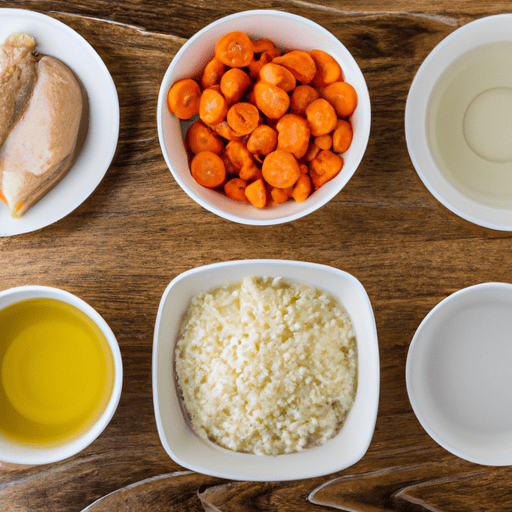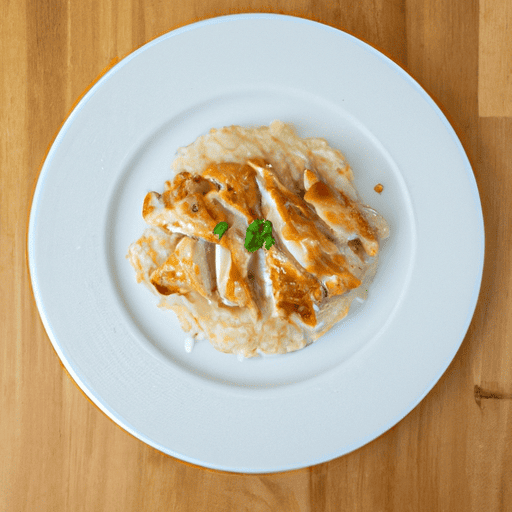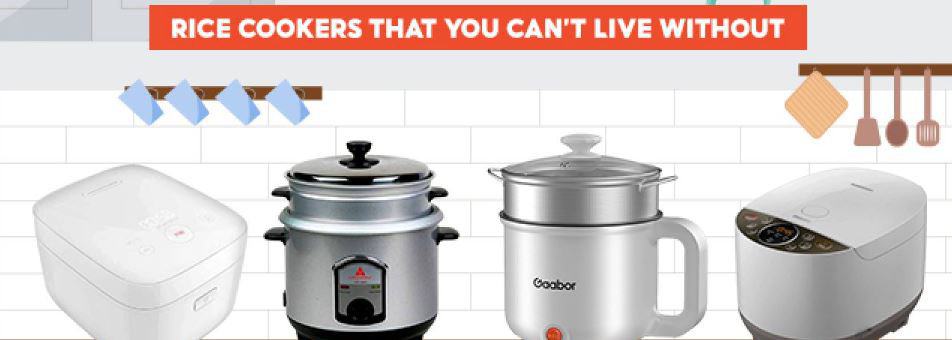Welcome to Rice Cookers 101! Today, we are excited to share with you a delicious recipe for Japanese Chicken Rice. This dish is a savory and comforting meal that can be enjoyed any day of the week. With the help of your trusty rice cooker, this recipe is simple to prepare and guaranteed to impress. So, let’s get started and enjoy this flavorful dish together! We’ve made this japanese chicken rice recipe easy to follow 👨🍳. If you’re looking for our favorite rice cookers to make this recipe, check out our list of top rice cookers here.

Ingredients
- 2 cups uncooked Japanese or short-grain rice
- 2 1/2 cups water
- 1 pound boneless, skinless chicken breasts, cut into bite-size pieces
- 2 tablespoons vegetable oil
- 1 onion, chopped
- 1 carrot, peeled and chopped
- 1 cup frozen peas
- 3 tablespoons soy sauce
- 1 tablespoon sake (Japanese rice wine)
- 1 tablespoon mirin (Japanese sweet rice wine)
- Salt and pepper, to taste
Instructions
- Rinse 2 cups of Japanese or short-grain rice in a fine mesh strainer under cold water for about a minute until the water runs clear. Drain the rice and add it to a medium-sized pot.
- Add 2 1/2 cups of water to the pot and let it soak for 15-20 minutes.
- Bring the pot to a boil over high heat. As soon as it boils, reduce the heat to low and cover the pot with a tight-fitting lid. Cook for 12-15 minutes or until the water is absorbed and the rice is tender.
- While the rice is cooking, heat 2 tbsp of vegetable oil in a large pan over medium-high heat. Add 1 pound of bite-size boneless, skinless chicken breasts and cook for 4-5 minutes or until browned on all sides.
- Add 1 chopped onion and 1 peeled and chopped carrot to the pan, and cook for another 3-4 minutes until the vegetables are just soft.
- Stir in 1 cup of frozen peas, 3 tbsp of soy sauce, 1 tbsp of sake (Japanese rice wine), and 1 tbsp of mirin (Japanese sweet rice wine). Cook for another 2-3 minutes or until the peas are heated through.
- Serve the chicken mixture over the cooked rice. Season with salt and pepper, if desired.

How long does japanese chicken rice last in the fridge?
Japanese chicken rice can usually be stored in the fridge for up to four days after cooking, provided that it is stored properly in an airtight container. It is important to refrigerate the rice as soon as possible after cooking to prevent any bacterial growth or spoilage, which can lead to foodborne illness or an unpleasant taste and texture. When reheating the rice, it is recommended to add a small amount of water to help restore the rice’s moisture and fluffiness. Additionally, one should make sure to reheat the rice thoroughly, reaching a temperature of at least 165°F (74°C), to ensure that any bacteria that may have grown during storage are destroyed.
Low calorie japanese chicken rice recipe substitutions
To make this Japanese chicken rice recipe lower in calories, several substitutions can be made. Firstly, you can swap the vegetable oil for a calorie-free cooking spray, or use less vegetable oil. Secondly, use chicken breasts without the skin, which can reduce the amount of fat and calories in the dish. Instead of using white rice, substitute it with brown rice or cauliflower rice, which can add nutrition and fiber to the dish. You can also reduce the amount of soy sauce used in the recipe, as soy sauce can be high in sodium. Additionally, reduce the amount of sake and mirin used, or omit them entirely. Overall, these substitutions can make the dish healthier and lower in calories while still preserving its flavor.
What to serve with a japanese chicken rice?
Japanese chicken rice is a delicious and flavorful dish on its own, but it can be complemented with a few side dishes to make a complete meal. One great option is to serve some steamed vegetables, such as broccoli or bok choy, on the side. These vegetables will add some color and texture to the meal, and will provide a dose of healthy vitamins and nutrients. Alternatively, you could serve some miso soup to start the meal, or some edamame as an appetizer. Whatever you choose, the key is to keep the flavors and textures balanced and complementary.
Whats the best sauce for a japanese chicken rice?
The best sauce for Japanese chicken rice would be teriyaki sauce. This savory and slightly sweet sauce is made with soy sauce, sugar, and mirin, a traditional Japanese rice wine. It adds a burst of flavor to the dish without overpowering the other ingredients. To make the sauce, simply simmer the ingredients together until they thicken and become slightly sticky. Drizzle it over your chicken and rice for a delicious and authentic Japanese flavor. Alternately, you could also use soy sauce or ponzu sauce as a lighter and tangy option.
Japanese chicken rice health benefits
Japanese chicken rice, or oyakodon, can offer various nutrients from its ingredients. Chicken provides high-quality protein, vitamin B6, and niacin that can support muscle growth and repair, brain function, and healthy skin. Eggs are also a good source of protein, vitamin D, and choline for bone health, calcium absorption, and brain development. Rice is the main source of carbohydrates for energy, and it also contains some fiber, vitamin B1, and iron. However, keep in mind that oyakodon can be high in sodium, depending on the amount of soy sauce used. To make it healthier, reduce the sodium by using low-sodium soy sauce or tamari, and add more vegetables such as spinach or broccoli. If you want a different recipe that is even healthier, I recommend making a simple quinoa salad with roasted vegetables and a lemon vinaigrette. Quinoa is a protein-rich grain that contains essential amino acids, fiber, and minerals such as magnesium and zinc. Roasted vegetables such as sweet potatoes, bell peppers, and zucchini add more vitamins, antioxidants, and flavor to the salad. The lemon vinaigrette provides a tangy and refreshing taste that complements the nuttiness of quinoa and the sweetness of vegetables.

